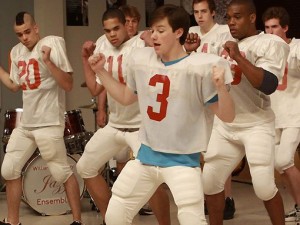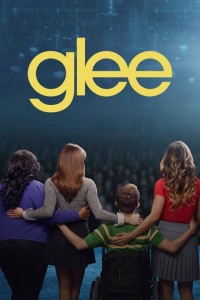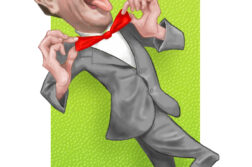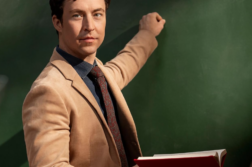EVERYONE’S ACCOUNT of high school is different. For the jocks, it’s a time of tiny triumphs, of touchdowns, and cheerleaders. For punks and goths, it’s the age of rebellion, while for nerds and other pariahs, high school is a penitentiary of social embarrassment. “High school is a caste system,” declares cheerleading coach Sue Sylvester (played by Emmy-winner Jane Lynch) on Glee, the hit television series now in its second season on Fox. “Your jocks and popular kids—up in the penthouse. Your invisibles and the kids playing live-action druids and trolls out in the forest—bottom floor.” Sylvester’s arch-nemesis, Will Schuster (played by song-and-dance man Matthew Morrison), naïvely asks where the members of his glee club fall in such a hierarchy, to which Sue smirks and replies: “sub-basement.”
But now American adolescents have a new clique to reckon with: the “gleeks,” fans of the misfit members of the William McKinley High School glee club. Gleeks are hardly a niche audience; more than thirteen million Glee fans tuned in earlier this spring to catch the first episode after a four-month hiatus. The show’s creators are Ryan Murphy, Ian Brennan, and Brad Falchuk. Murphy had already scored on the small screen with FX’s surgical series Nip/Tuck and he adapted and directed the Julia Roberts movie Eat Pray Love. Murphy’s high school experience was a surprisingly easy one for a gay kid from Indianapolis: “I’ve always known I was gay,” he told Rolling Stone (4/15/2010). “In high school, I felt loved. … I was a hell-raiser, but I was happy.” That could explain the show’s sunny disposition, its bright production design, and bubbly score—which kill any semblance of realism. Hey, the worst thing that can happen to you in the halls of McKinley is having a blue slushie thrown in your face. This, and the fact that students inexplicably burst out into song mid-sentence, gives Glee the ebullient bounce of a musical comedy.
The mood matches the show’s music, which has spawned at least three top-selling collections on the Billboard charts. Beating out the soundtrack to The Twilight Saga (another teenage preoccupation at present), Glee: The Music, Journey to Regionals sold 152,000 copies in just one week. Each episode of the show braids together the seemingly incompatible songs of Oliver!, Amy Winehouse, Guys and Dolls, and REO Speedwagon to blur the boundary between TV program and iPod playlist. Indeed the show produces week-to-week what once seemed impossible: enjoyable, even artful, karaoke. Sylvester, however, is hardly amused. “Loving musical theatre doesn’t make you gay,” she opines, “it makes you awful.”
Don’t tell that to Kurt, the diva-like teenager played by twenty-year-old Chris Colfer, who loves to belt out show tunes like “Defying Gravity” from Wicked. Also defying stereotype, Kurt leads McKinley’s football team to victory after serving not only as its star kicker but as the team’s choreographer. He teaches his teammates a dance routine (set to Beyoncé’s “Single Ladies”) to distract and disorient their opponents. Riding high as a star athlete and artist, he comes out to his father, a mechanic who’s so supportive that he later chides Finn, the team’s captain, for calling his son a “fag.” He also goes to bat for his son when Mr. Schuster denies Kurt the chance to sing “Defying Gravity” because the song is traditionally sung by a girl. (This happened to Colfer in real life, so Murphy built an episode around the idea.)

But McKinley High of Lima, Ohio, isn’t purely a fantasy land: the head of the chastity club is pregnant, Kurt is routinely hurled into the dumpster, and the disabled character Artie is considered a “cripple” and an impediment to the glee club’s shot at success. The character of Ra-chel, played by 23-year-old Broadway veteran Lea Michele, is also something of an outsider because of her gay dads and her high-octane ambition to upstage her fellow glee-mates. She too is slushied for being a prima donna, and her antics especially incense Sylvester, who grumbles that “gay parents encourage rebellion.” Michele is by far the cast’s strongest vocalist—she made her debut at age eight in Les Misérables—so strong, in fact, that producers of the upcoming Funny Girl revival have their eyes on her to reprise the role that made Streisand a star.
Then there’s Jane Lynch, who is arguably the strangest, most original character on primetime TV. Her character Sylvester is a big piranha in a small pond. She complains to her indifferent colleagues in the teachers’ lounge that her wrist is sore from signing autographs at the local Donut Hole, and she brags that she has a “phoner” (a phone interview) with Splits magazine to discuss her cheerleading champs—her “Cheerios”—who deserve the school funds wasted on the glee club. Off-screen, Lynch is an out lesbian and Second City alumnus, and she stole the show in such studio comedies as The Forty-Year-Old Virgin and Role Models with a delivery so deadpan, it’s postmortem. Her funniest film role to date was in the canine comedy Best in Show, in which she played another cutthroat competitor, Christy Cummings, the handler of a standard poodle and founder of a magazine called American Bitch (serving the “lesbian purebred dog owner” community). Glee has never been so rife with irony as when Lynch attempted to seduce guest star Neil Patrick Harris (also openly gay), telling him that, “like Letterman,” she keeps a “secret room upstairs” for her rendezvous.
The coach always has the last word on Glee, and it’s fitting that she be given it here. We see her at her office desk, amid her trophies, scribbling in her journal: “Every time I try to destroy that clutch of scab-eating, mouth-breathers, it only comes back stronger like some sexually ambiguous horror-movie villain. I’ve sacrificed everything only to be shanghaied by the bi-curious machinations of a cabal of doughy, misshapen teens.” Despite such protestations, it looks as if America’s favorite gay-friendly glee club is here to stay.






